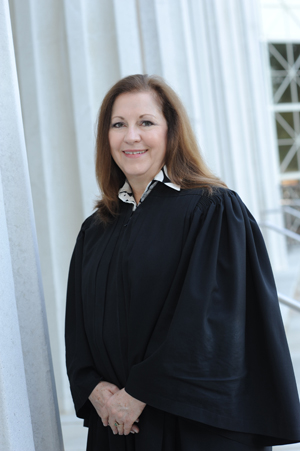Juvenile court judge rises to national leader
August 25, 2011
 ATLANTA -- When Peggy Walker (M. Ed ’82, JD ’86) became a Douglas County Juvenile Court judge in 1993, she knew she had a complex, high-stakes role in shaping the next generation. Back then, she turned to a national resource group for help, and today, she is helping lead it.
ATLANTA -- When Peggy Walker (M. Ed ’82, JD ’86) became a Douglas County Juvenile Court judge in 1993, she knew she had a complex, high-stakes role in shaping the next generation. Back then, she turned to a national resource group for help, and today, she is helping lead it.
In July, the National Council of Juvenile and Family Court Judges elected Walker to the executive committee, and over the next four years she will volunteer in roles from secretary to president. Her leadership skills will aid judges grappling with changing social issues and laws. She will help shape the seminars, research and nationwide network that in the past has helped her become a better judge, not only through her caseload but in streamlining communication and delivery of services to Douglas County families and children.
Juvenile court judges “have to understand child development, mental health and substance abuse, the education system – especially special educations and services vital to public health, and why those are utilized or not… and not give conflicting instructions regarding a child,” said Walker, 58, a mother and grandmother.
She found her calling by volunteering at juvenile court while still in private practice. Her background as a high school teacher – and grounding in the law thanks to “toughness of the law professors at GSU,” where she was law review editor from 1984-86 and served on the mock trial team– uniquely prepared her for this specialty.
Drawing from the National Council’s deep well of assistance, which was founded back in 1937, Walker shaped a holistic approach to family issues that seeks to leverage resiliency of children and adults. Her most sensitive decisions involve infants and toddlers.
“They have the highest death rates in custody or supervision, and if moved to foster care, they will stay the longest and have the highest re-entry rates,” she noted. “We’re talking about non-verbal children without a safety net of school. For me, it’s not a burden, but a privilege to make a decision for their well-being.”
The same no-nonsense approach applies to her new national role, in which diversity issues will be top priority, closely followed by resource development. Said Walker, “I’m willing to put in the time and effort because the National Council made me a better judge than I would have been otherwise.”
By Michelle Hiskey
Contact:
Wendy Cromwell
Director of Communications
404.413.9050